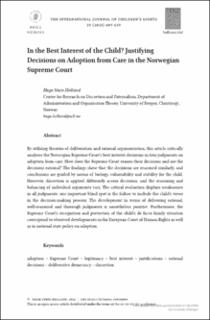In the Best Interest of the Child? Justifying Decisions on Adoption from Care in the Norwegian Supreme Court
Journal article, Peer reviewed
Published version

Åpne
Permanent lenke
https://hdl.handle.net/11250/2987405Utgivelsesdato
2021Metadata
Vis full innførselSamlinger
- Department of Government [457]
- Registrations from Cristin [9791]
Originalversjon
The International Journal of Children's Rights. 2021, 29 (3), 609-639. 10.1163/15718182-29030004Sammendrag
By utilising theories of deliberation and rational argumentation, this article critically analyses the Norwegian Supreme Court’s best interest decisions in four judgments on adoption from care. How does the Supreme Court reason their decisions and are the decisions rational? The findings show that the decisions are reasoned similarly, and conclusions are guided by norms of biology, vulnerability and stability for the child. However, discretion is applied differently across decisions, and the reasoning and balancing of individual arguments vary. The critical evaluation displays weaknesses in all judgments: one important blind spot is the failure to include the child’s views in the decision-making process. The development in terms of delivering rational, well-reasoned and thorough judgments is nonetheless positive. Furthermore, the Supreme Court’s recognition and protection of the child’s de facto family situation correspond to observed developments in the European Court of Human Rights as well as in national state policy on adoption.
